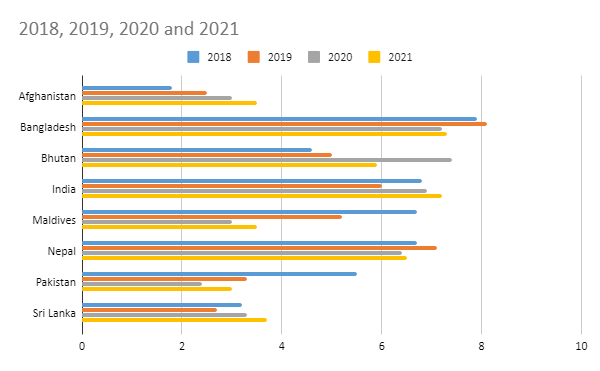Bangladesh 2nd fastest growing economy in South Asia: WB

Image collected
Bangladesh’s economy is forecasting to grow faster than all countries in South Asia except Bhutan in the current fiscal year, World Bank has said.
According to the latest edition of the “South Asia Economic Focus, Making (De) Centralisation Work”, the gross domestic product in Bangladesh is projected to moderate to 7.2 per cent this fiscal year and 7.3 per cent the following one.
“The outlook is clouded by rising vulnerability financial sector, but the economy is likely to maintain growth above seven per cent, supported by a robust macroeconomic framework, political stability, and strong public investment,” the WB report said.
The report forecasts that Bangladesh’s economy would grow at a faster pace than India, Nepal, Sri Lanka, Pakistan, the Maldives and Afghanistan.
The report said Bhutan’s GDP growth is expected to jump to 7.4 per cent this fiscal year.
In India, after the broad-based deceleration in the first quarters of this fiscal year, growth is projected to fall to six per cent this fiscal year that ending in March next year.
The growth is expected to gradually recover to 6.9 per cent in the fiscal year 2020-21 and to 7.2 per cent in the following year.
Pakistan’s growth is projected to deteriorate further to 2.4 per cent this fiscal year.
In Sri Lanka, the growth is expected to soften to 2.7 per cent in 2019.
In the Maldives, growth is expected to reach 5.2 per cent in 2019 and in Nepal, GDP growth is projected to average 6.5 per cent over this and next fiscal year.
Afghanistan is expected to recover and reach three per cent in 2020 and 3.5 per cent in 2021.
In line with a global downward trend, the growth in South Asia is projected to slow to 5.9 per cent in 2019, down 1.1 percentage points from April 2019 estimates, casting uncertainty about a rebound in the short term.
The report finds the strong domestic demand, which propped high growth in the past, has weakened, driving a slowdown across the region.
“Declining industrial production and imports, as well as tensions in the financial markets, reveal a sharp economic slowdown in South Asia,” said Hartwig Schafer, vice president of the World Bank for South Asia, in a statement.
“As global and domestic uncertainties cloud the region’s economic outlook, South Asian countries should pursue stimulating economic policies to boost private consumption and beef up investments.”
In a focus section, the report highlights how their economies become more sophisticated, South Asian countries have made decentralisation a priority to improve the delivery of public services.
With multiple initiatives underway across the region to shift more political and fiscal responsibilities to local governments, the report warns, however, that decentralisation efforts in South Asia have so far yielded mixed results.
For decentralisation to work, central authorities should wield incentives and exercise quality control to encourage innovation and accountability at the local level.
Rather than a mere reshuffling of power, the report calls for more complementary roles across all tiers of government, in which national authorities remain proactive in empowering local governments for better service delivery.
“Decentralisation in South Asia has yet to deliver in its promises and if it is not properly managed it can degenerate into fragmentation,” said Hans Timmer, chief economist of the WB for South Asia.
“To make decentralisation work for their citizens, we encourage South Asian central governments to allocate their resources judiciously, create incentives to help local communities to compete in integrated markets and provide equal opportunities to their people,” he said.
Source: https://www.thedailystar.net
Tags :
Previous Story
- World Bank forecasts 7.2 pct GDP growth for...
- Bangladesh second quickest developing economy in South Asia:...
- Growth lessons India can take from new frontrunner...
- By 2030, Bangladesh will be the 24th largest...
- Bangladesh eyes double-digit GDP growth in 5 years
- SME contribution still negligible: study
- Bangladesh benefits from China's development
- How Kormo and Banglalink are Helping the Urban...